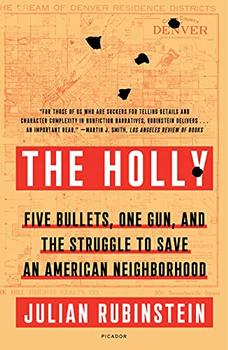Summary | Excerpt | Reviews | Readalikes | Genres & Themes | Author Bio

Five Bullets, One Gun, and the Struggle to Save an American Neighborhood
by Julian RubinsteinACT I
1
Terrance's grandmother, Ernestine Boyd, was nineteen when she decided to run away. It was 1955. The eldest of ten, she was living with her parents and nine siblings in a small cabin on a cotton plantation in Bradley, Arkansas, where the family worked. She had just been promoted to cook, which seemed to be a blessing. She hadn't enjoyed picking cotton in the baking sun, for two dollars a day. In the kitchen, she'd make three dollars, and the plantation owner and his wife, on whose property she'd lived since she was six, loved her cooking.
But a few days into the new job, Mr. Pearson, the plantation owner, came into the kitchen and grabbed Ernestine from behind. He tried to kiss her. When she pushed him away he said something that kept her up all night. He asked if she would like to see the "nigger" who'd recently come by on his bike to pick her up "lying in a ditch."
Ernestine wasn't sure yet if she was in love with the man on the bike. Tall, lithe, and spirited, she had many suitors. But by morning she was sure of one thing: she couldn't bear to be the cause of someone else's death.
She had an aunt who had recently uprooted from Mississippi, where Ernestine was born, to a place called Denver. Ernestine knew nothing about Denver except for a postcard from her aunt, depicting a line of snowcapped mountains marching across a sunny horizon. Without telling her family for fear of retribution against them, Ernestine skipped work the next day and made her way to the town bus. Carrying $110 and a small bag, she was leaving home, for good.
Her journey out of the South was solitary but hardly unique. Nearly five million African Americans left a former slave state between 1940 and 1979, the largest migration of the American populace in the twentieth century. As her bus rode north and west through the empty prairies of Missouri, Kansas, and eastern Colorado, she would have been hard-pressed to imagine the overcrowding that Black neighborhoods in Chicago, Los Angeles, and Oakland already faced, a burgeoning housing crisis that would help spark the civil rights movement.
Denver was the largest city within a radius of several hundred miles, a regional hub with a population of about 450,000. It had no professional sports teams. Vail Ski Resort was still seven years from opening. A rodeo and stock show were the capital city's biggest event.
But for Ernestine, Denver appeared full of promise. When she arrived at the downtown bus station, vendors of different races were selling flowers and newspapers, and a line of taxicabs waited, accepting customers of any race. She got into one, without any idea where to tell the driver to take her.
Her unfamiliarity with the city was of no consequence. There was only one place for "Negroes" in Denver. Located about a dozen blocks northeast of the capitol, the Five Points neighborhood was established about a decade after William Larimer, a land speculator from Kansas, founded Denver City in 1858.
In 1879, Five Points grew during the "Exoduster Movement," in which approximately forty thousand former slaves headed west to Kansas, Oklahoma, and Colorado. By the turn of the century, following the gold and silver mining boom in the nearby Rocky Mountains, Five Points had its own cable car—Denver's first—and was said to have more Black-owned businesses than anyplace west of Harlem.
The neighborhood's most famous establishment, the Baxter Hotel, sat on its namesake corner, where five streets came together. Renamed the Rossonian in 1929, it was frequented in the 1920s by Duke Ellington. Later, it hosted Ella Fitzgerald, whose late-night performances there after playing Denver's white venues gave Five Points its moniker, "Harlem of the West." Like Harlem, Five Points was open to anyone, though few from outside the community visited. One who did was Jack Kerouac, who memorialized Five Points in his 1947 book On the Road, describing a walk through the neighborhood on a redolent "lilac evening … with every muscle aching among the lights of 27th and Welton in the Denver colored section, wishing I were a Negro, feeling that the best the white world had offered was not enough ecstasy for me."
Excerpted from The Holly by Julian Rubinstein. Copyright © 2021 by Julian Rubinstein. Excerpted by permission of Farrar, Straus & Giroux. All rights reserved. No part of this excerpt may be reproduced or reprinted without permission in writing from the publisher.
Life is the garment we continually alter, but which never seems to fit.
Click Here to find out who said this, as well as discovering other famous literary quotes!
Your guide toexceptional books
BookBrowse seeks out and recommends the best in contemporary fiction and nonfiction—books that not only engage and entertain but also deepen our understanding of ourselves and the world around us.